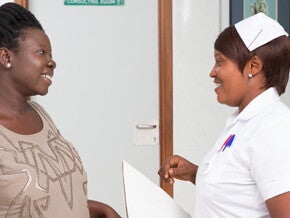
Pregnancy Week 18
Lots of leaps and bounds happening in week 18, from nerve cells multiplying to the beginnings of fingerprints.
Be prepared for these 18 weeks pregnant symptoms and signs
BABY DEVELOPMENT
In just one of pregnancy’s incredible facts, by this week your baby’s nerve cell endings count is between 12 and 14,000,000,000! That’s a whole lotta zeros. His heart is now big enough that we can hear his heartbeats with a simple stethoscope placed on your stomach. Muscles are getting stronger, too, and his movements more vigorous so if you haven’t felt your baby dancing around yet, you should soon. It all depends on the temperament of your baby. Other developments are taking place with his hands - his fingers are beginning to get little nails and fingerprints are starting to emerge.
YOUR BODY
It is quite unbelievable to stroke your belly and know that there is a person growing in there. And when you imagine interacting with this little person – how they will smile, what they will look like – it is quite incredible, isn’t it? Perhaps you know your child’s sex. Or maybe you are waiting until her birth to find out. Either way, it’s almost time for the second ultrasound scan. This time, your doctor be able to verify that your child is developing healthily, but also whether it is a girl or a boy. Don’t be disappointed if you would like to know but nothing can be seen yet. Your child has to be lying “correctly” or even the most practised gynaecologist’s eye cannot recognise anything.
NUTRITION
Unfortunately, pregnancy can interfere with normal bowel movements. We can’t stress it enough: a diet rich in fibre can help. Fresh or cooked green vegetables, fruits, and lots of whole grains can work wonders. However, be cautious with bran or wholemeal bread if you aren’t used to it because too much can irritate the intestines. Drink enough (2 litres of fluid per day) to hydrate and facilitate “transit”. And try starting your day with a glass of water or fresh orange or grapefruit juice with the pulp left in. Soak prunes overnight to soften them and enjoy for breakfast with yoghurt – they are non-irritating, safe natural laxatives and can help with your lazy bowel function. If, despite these small tips, your worries persist, talk to your doctor. Above all, do not take over-the-counter laxatives.
TIPS
You’ve been told to consume lots of calcium-rich foods to strengthen your bones and those of your baby but what do you do in case of lactose intolerance? You just have to be more creative to get your needs met. A lot of people with lactose intolerance can still continue to eat cheese or yogurt (the lactose is largely removed during fabrication, metabolised by lactic acid-fermenting ‘good’ bacteria). There are also lactose-reduced milks. Besides dairy products, dark and leafy vegetables (including “sea vegetables” – seaweed) and dried beans are also great sources of calcium.



